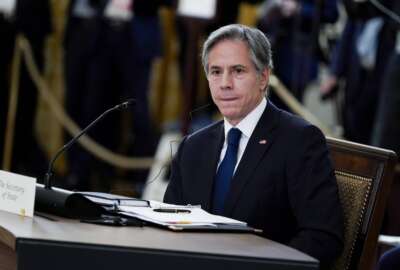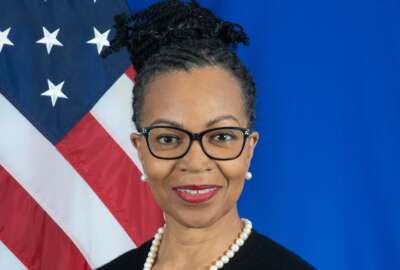State Dept diversity chief outlines plan to address ‘toxic conduct’ in workforce survey
The State Department’s first chief diversity and inclusion officer is asking Congress for more funding to build out its data analytics capabilities, after...
The State Department’s first chief diversity and inclusion officer is asking Congress for more funding to build out its data analytics capabilities, after spending much of the past two years getting a baseline of the department’s workforce diversity.
CDIO Gina Abercrombie-Winstanley told members of the House Foreign Affairs Committee that the department’s leadership is addressing issues outlined in a workforce survey her office led last year.
Abercrombie-Winstanley told members of the oversight and accountability subcommittee the department is focused on the “need to level the playing field, so that everyone who wants to serve our country can, to the best of their abilities.”
“Now that we have a better sense of who we are, we can better ensure that we tap the best and brightest among all Americans to represent this great nation,” she said Tuesday. “We intend to attract, hire, promote and retain talent, and remove barriers that might keep some from rising as far as their abilities can take them.”
Nearly 9,000 employees — about a third of the department’s direct hires — responded to the survey. Respondents said their top recommendation was to remove barriers to merit-based promotion.
The department, looking to eliminate one potential bottleneck, has already made interview panels a best practice for hiring and promotion decisions, rather than leaving the decision up to a single individual.
Abercrombie-Winstanley said the department is also conducting barrier analyses and considering additional changes to how it makes promotion decisions.
The survey results, she added, also showed “too many” employees reported discrimination, harassment or bullying, and expressed “little confidence that the department would address it.”
“We intend to fix that. We intend to take on toxic conduct,” she said.
As CDIO, Abercrombie-Winstanley is tackling workforce diversity challenges that have been documented by watchdogs for decades.
The Government Accountability Office in 2020 found racial and ethnic minorities within the department’s civil service were up to 29% less likely to receive a promotion than their white peers with similar qualifications.
A GAO report from 1989 outlines many of the same conclusions as the 2020 report.
Committee Ranking Member Gregory Meeks (D-N.Y.) said the department is making progress on these longstanding issues.
“The challenges faced by our foreign affairs and national security agencies in creating a more diverse workforce, they’re not new,” Meeks said. “They have persisted for decades, and progress has happened, but it’s slow.”
Abercrombie-Winstanley said over 80% of senior positions at the State Department are held by European-Americans, and that more than half 50% are held by men.
“One of the challenges still is that you can walk into a room and see few women inside, so that hasn’t changed as much as I would have liked,” she told lawmakers. “But I also walk into many rooms where half of the room is female, and that means that we are really getting the people in place that should be there,” she said.
Abercrombie-Winstanley is stepping down from the CDIO position, after more than two years on the job.
“I’m proud of what my team and I have been able to accomplish so far. As I prepare to transition, I’m optimistic about the future, and I anticipate that my successor yet to be named will build on our achievement,” she said.
Among the changes made during her tenure, the department’s Civil and Foreign Service personnel are now evaluated in part by how their work helps advance transparency and inclusion or accountability.
The department is also now paying interns for many of its programs, and has launched new fellowships to diversify the next generation of its workforce.
“There are many young Americans across the country who cannot afford to offer free labor to the department,” Abercrombie-Winstanley said.
The department, she added, recently allowed nursing mothers to bring lactation devices into classified areas. It’s also taking steps to ensure every mission overseas has accessible housing for diplomats or their family members with disabilities.
Abercrombie-Winstanley said the department’s retention unit is conducting a review of employees who had already left the department, in order to understand their motivation for leaving the department midway through their careers.
“The reality is, if people leave before we’re getting our full muster from them, we are not using the taxpayer money that it takes to train them, to house them, to send them around to have them be excellent representatives of the United States,” she said.
Rep. Andy Kim (D-N.J.), a former diplomat who served both domestically and abroad, said his treatment as a Korean-American working at the State Department influenced his decision to leave.
Kim recalled receiving a letter during his tenure, prohibiting him from working on policy issues related to the Korean peninsula. He said he was surprised to receive the notice, since he had just returned from Afghanistan and worked mostly on the Middle East.
“It was something that really made me wonder whether or not I had a future here at the State Department — whether or not I could continue on if my employer, the United States government, was questioning whether or not I would be able to adequately represent and loyally represent the United States,” Kim said.
The department, in its fiscal 2024 budget request, is asking for $76 million for diversity, equity, inclusion and accessibility programs.
Most of those funds would be spread throughout the department. The CDIO’s office would only receive about 10% of those funds to support departmentwide coordination, travel and data analysis.
The budget request would allow the CDIO’s office to grow its staff from 12 to 14 employees
About $3.8 million in the department’s budget request would go toward additional DEIA data projects. Nearly $1 million of those funds would go toward the CDIO’s office hiring its own data analysts.
“At this time, we are at the mercy of where the data analysts sit in other parts of the building,” Abercrombie-Winstanley said.
Another $200,000 would go toward the department to conduct a follow-up survey to see what DEIA improvements have been made.
The State Department, following the release of its DEIA strategy last year, now holds disaggregated workforce data sets that break down the composition of its workforce across nearly every one of its offices.
Abercrombie-Winstanley said the State Department plans to release annual data reports showing trends in the diversity of its workforce.
“We cannot achieve merit-based advancement without data,” she said.
Republicans on the committee, however, pushed back on the department making hiring and promotion decisions based on any criteria other than merit.
Subcommittee Chairman Brian Mast (R-Fla.) said the department was prioritizing a candidate’s identity “equal to their ability to demonstrate leadership.”
“No part of our government, including the State Department, should look any certain way. It should reflect hard work, loyalty to America, patience, willingness to sacrifice, a sense of duty, consistency, honor, discipline, confidence,” Mast said. “Those are the traits that all hiring should be based on.”
Republican lawmakers criticized the State Department for recent changes in how Foreign Service officer candidates are assessed.
The agency, starting in June 2022, no longer uses the Foreign Service Officer Test (FSOT) scores as the sole criteria for who moves on to the next steps of the selection process.
Foreign Service applicants will still take the written test, but the State Department will no longer treat the FSOT as a “pass/fail gateway.”
Abercrombie-Winstanley said there have been many changes to the Foreign Service selection process over the years, and that many current Foreign Service officers, including those admitted through fellowship programs, have never taken the test.
“These people have had successful careers as Foreign Service officers, so the written test has never been the be-all end-all of who is going to be a successful diplomat,” she said.
Copyright © 2025 Federal News Network. All rights reserved. This website is not intended for users located within the European Economic Area.
Jory Heckman is a reporter at Federal News Network covering U.S. Postal Service, IRS, big data and technology issues.
Follow @jheckmanWFED
Related Stories

State Department overhauls workforce data to track DEIA goal progress




